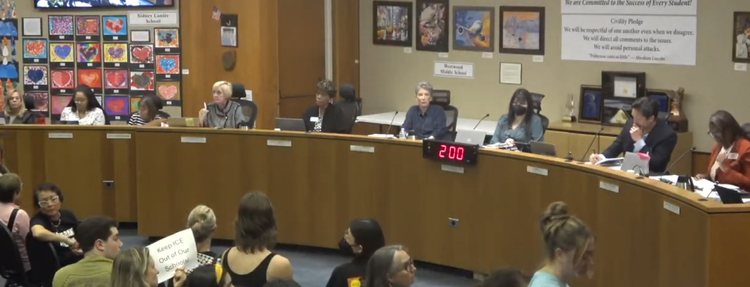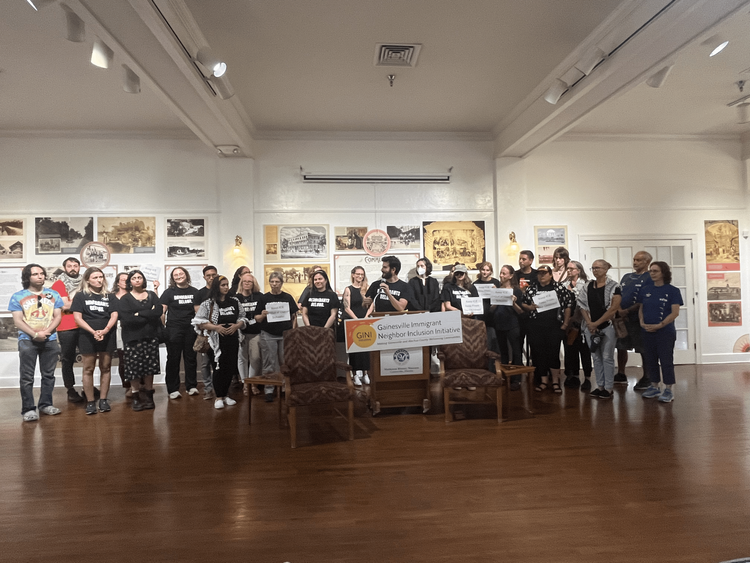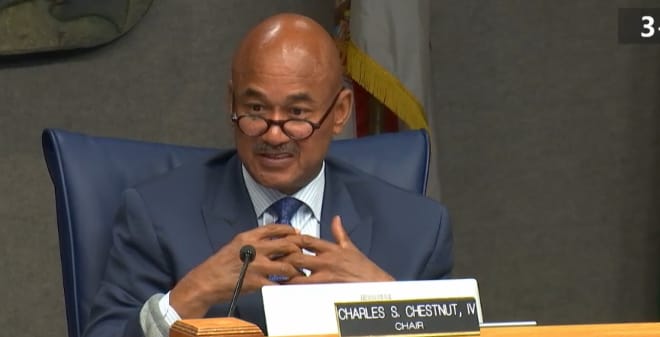GRU Authority Rolls Back Service Disabled Veterans Preference and Other City Ordinances

On the evening of December 14 the Gainesville Regional Utilities (GRU) Authority held a meeting to discuss hiring external legal counsel, procurement policies, and the city auditor’s role pertaining to GRU. During member comment the board passed a motion to begin the search for a new general manager, making sitting manager Tony Cunningham an interim.
The meeting began with general public comment on non-agenda items. Former city commission candidate Jim Konish brought up concerns about the debt reduction plan and the validity of financial statements made by GRU.
“If you have $1.849 billion in debt and if you defease it by $32 million a year with no interest and no additional borrowing, it's a $57.78-year payback, sir. That’s not a plan to deal with the debt; that’s a farce. Ask any 3rd grader.”
The board then motioned to adopt the agenda and approve the minutes. Before moving on to the first item one speaker criticized the minutes publicized for the previous meeting, saying they did not reflect its “appalling nature.”
At the previous meeting, Vice Chair of the Authority James Coats made a motion to fire Cunningham, accusing him of creating a hostile work environment and misappropriating funds. Many attendees of the meeting compared Coats' questioning of Cunningham to a trial, asking him and other GRU executives a series of yes or no questions.
Cunningham opened the first agenda item, proposing the options to either continue with the current auditor or select a different auditor for the authority. Board member Eric Lawson made the motion to have Cunningham pause internal audit work in the city and bring back a recommendation in Spring 2024, which was seconded by Coats.
When members of the public were permitted to comment on the motion, Konish took the stand again to criticize the board for waiting months for a recommendation, going on to accuse the board of violating Article 7 of the Florida constitution by having a city auditor who is employed by the city commission. Another speaker called it a “conflict of interest,” comparing it to how the city attorney for the board is the same attorney for the commission.
After hearing the public’s comments, the board passed the motion.
The next item on the agenda for the board to discuss was procurement policies and making sure the board’s policies comply with Florida law and city ordinances. Minimum requirements include abiding by Sunshine Laws, which prohibit board members from having private discussions that would limit public access to governmental proceedings.
The Chief Financial Officer at GRU, Claudia Rasnick, stated the board did not have to follow city ordinances if they contradicted House Bill 1645, which established the board. She stated the city commission implemented several ordinances for “ideological” or “political reasons,” such as the Living Wage Ordinance and the Small Business Enterprise Ordinance. She suggested it would be appropriate to remove the ordinances for cost reduction.
Coats made the motion to stick with the staff’s recommendation of changing procurement to only having the minimum state requirements, which was seconded by Robert Karrow.
When members of the public went to speak, the motion was widely disapproved. GRU ratepayer Tyler Forest condemned the motion, saying that changing the procurement policies to only uphold the minimum requirements of Florida law would get rid of disabled veteran programs in the Small Business Enterprise Ordinance.
“Doing away with the Service Disabled Veterans Preference, the Small Business Preference, and the government minimum wage simply so you can pay back Wall Street bankers a little quicker at our communities expense is appalling.”
Afterward, Coats asked the board if they could add back the veteran's preference, stating it was important to him. Chair Craig Carter agreed that it was important but voiced in support of the motion.
“I think right now we’re stripping back, and then as a board, we’d bring up something. Also, I’d love to know how often this is in effect. Do we have anything saying some veterans have gotten some jobs? We might come back with a veteran mouse trap, is what I’m saying. I don’t know the answer, but I'm definitely passionate about veterans.”
The motion passed as it was originally stated.
The board moved on to talk about potentially acquiring independent legal counsel for the GRU authority. The board has been in discussions with attorney Scott Walker about a contract that would hire him as their legal counsel.
Daniel Nee currently sits as the attorney for the board, which has caused criticism as he simultaneously serves as Gainesville’s city attorney.
Karrow argued that, as a city attorney, Nee is representing the city and not the authority. Nee argues that the GRU authority is an extension of the city, thus making it legal to serve as the authority’s counsel.
The recommended action on the motion was for the GRU staff to draft a contract specifying the source to be used in hiring the authority’s counsel. The contract has a $50,000 limit and would require a monthly evaluation of the source. GRU staff would additionally develop a Request for Proposal (RFP) to specify the services that the council would provide for the authority.
Coats motioned to move forward with the RFP, which was seconded by Karrow.
During the time for public comment, Gainesville resident Kim Popejoy read the proposed contract between Walker and the authority out loud.
“Folds Walker, LLC, will provide guidance, consultation, and counsel to GRU. Fulls Walker LLC will not represent GRU in matters of insurance litigation, immigration laws, employee disputes, labor agreements, contract sign-offs, bond counsel, and disclosure counsel. These additional specialized labor-intensive specialties will be requested as part of legal services representation requests for proposal… Folds Walker LLC will provide expertise on multiple subjects, for example, but not limited to areas of legislative governmental issues, land use and zoning ordinances, resolutions, proclamations, contract language, lease and rental agreements, policy development, memorandum of understanding, and service level agreements.”
After hearing the public’s comments, the board passed the motion.
Carter then brought forward two more motions regarding the legal counsel with GRU, the first being authorization for him to sign a contract with Walker and the second being if the board would do an offset for the cost.
Karrow motioned that Carter be permitted to sign a contract with Walker, which was seconded by Coats. It was passed after public comment.
Carter went on to ask the board if anyone would like to make a motion to offset the cost, and Karrow asked what the current spending on attorney fees was. Cunningham went over the two expenses in the cost allocation plan, the first being Assistant City Attorney Bianca Lherisson’s bill at $181,147 and the second being the general allocation of costs from Nee’s law office at $114,546.
After discussing the legalities, the board decided to wait until the next meeting before deciding whether or not to offset the costs.
The board moved on to talk about a business plan proposed by GRU staff. Chief Sustainability Officer Eric Walters clarified that the board did not have to follow the plan and could go in a different direction.
Walters opened his presentation with the need for new GRU mission and vision statements, proposing multiple recommendations to the board, such as “Deliver competitive core services.” Coats proposed that they should put off talking about a mission statement for a workshop to increase citizen involvement, which Carter agreed with.
Walters went on to talk about proposed goals such as improving work culture and building customer trust. He finished by going into specifics, stating the number of workplace injuries should be less than 1 for every 200,000 total hours worked, an integrated resource plan (IRP) should be implemented by April 2024, and expense reductions should be identified.
Coats then moved to approve the development of the business plan, which was seconded by Karrow.
During the time for public comment, the proposed mission statements were criticized for not being about community or GRU ratepayers. Gainesville resident Tom Lyons criticized the board from a business perspective.
“You board members have a fiduciary obligation to return profits to the investors... What I’m hearing is that you want this to be a non-profit where everything gets pushed down into reducing rates. That’s great and will benefit a lot of investors who are citizens of Gainesville and have GRU, but you’re also taking profits from the investor and giving them to people who aren’t investors, GRU customers who live outside of the city... You’re proposing a business that will not have any return on investment (ROI) for the investor, and that ROI could be community engagement or doing what people in the community want with the profits of the company.”
The board passed the motion after public comment.
The final agenda item was on GRU’s budget, finances, and accounting. GRU’s director of accounting and finance, Mark Benton, gave a presentation on rates and government service contribution (GSC) scenarios. The item was informational, and no action was held.
Concluding, Carter proposed that a motion be brought forward to search for a new GRU general manager. Carter stated that Cunningham would be able to apply for the role, and the best of the best would be selected. Karrow motioned for Cunningham to become an interim, with Coats seconding.
Carter acknowledged his change in position from the last meeting, saying he was distracted due to the nature of the presentation. Coats had called up Walters and Rasnick and asked them questions about the work environment under Cunningham and if they feared their jobs if they spoke out against him. Carter said that at the time he was thinking more about whether or not Walters and Rasnick knew they were going to be called up beforehand.
During the public’s time for comment, Popejoy scrutinized the board for the motion’s contradiction to the last meeting’s decision.
"In your last meeting, you established that he had one year and that you would provide him with a set of metrics by which you would evaluate him. What is the possible purpose of you and your headache-driven attempt to create a new RFP? To create a new responsibility for you, the chair? To get out and try and create at this moment when this law has just churned this whole system? What is the possible benefit or purpose of this?”
Carter replied, “To get the best we can get, sir.”
The board proceeded to pass the motion. Cunningham gave his comments, stating that the new circumstances would not cause him to change course and that he’d still work with the board. The meeting was then adjourned.




